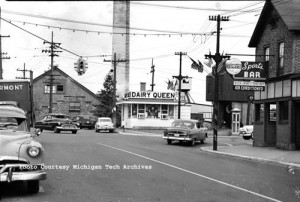Here at the MTU Archives we help people with a wide variety of research topics. As a recent graduate and summer intern in the Archives, working at the reference desk has been a great learning experience. I didn’t quite know what to expect when I started here, but one thing my education prepared me for was the range of knowledge of what an archive is among patrons. Not everyone that enters the archive knows exactly what the rules are in the reading room, the kinds of collections we have, or even what an archive is. But that’s ok! In fact, one of the most rewarding parts of working the reference desk has been helping people who are new to the process of doing research in an archive. Oftentimes, they are amazed at the kinds of material they are able to find, touch, and learn from.
For example, we recently had a couple come in who were trying to start a family history. Their ancestors had been miners in the Copper Country, as is often the case with any family that lived here from the mid 19th – mid 20th centuries. The MTU Archives has employment cards from two major copper mining companies of the area, Quincy and Calumet and Hecla, so I was able to find the employment cards for several of their relatives. When I brought them out, the couple was amazed that we had this material. The cards usually contain a ton of valuable information for genealogists, as well as signatures of the miners themselves. This last fact was noted by the pair with a certain amount of sentimentality, and they were so in awe of the piece of paper that they double checked that they were able to handle the material. It was great to be able to help these people, who were a little clueless as to how to begin their research, make a personal connection with history and show them how to get started on their project. That is, after all, what we’re here for!
However, things at the reference desk don’t always go smoothly. Occasionally patrons will forget to write down a collection name and box number for the material they were looking at, and come back later hoping we’ll remember. Since the MTU Archives does not take extensive notes on the material patrons use, it is sometimes impossible to think back and remember exactly which little blue box is needed out of thousands. Fortunately, through asking questions about the type of research a person is doing and the topics involved there is often a happy ending to these stories, even if there is a delay. When situations like this occur it definitely serves as a reminder that I need to be vigilant about educating new researchers of the importance of keeping track of their sources.
So far this summer I have found that some patrons, both new and veteran researchers alike, do not know about the Keweenaw Digital Archives, our online image data bank that holds over 10,000 images from the collections of the MTU Archives. I love it when people come in expecting to spend hours looking for a useful image, but with a quick introduction to the KDA website are able to find what they need with one keyword search. Recently, a descendant of the man who opened the first Dairy Queen in the Upper Peninsula came into the Archive and had such an experience. She was looking for a photograph of that first store, which was located in Houghton. Low and behold, the KDA contained one image that proved to be exactly what she was after. I hope she enjoyed a beautiful summer afternoon in the Copper Country with all the time she saved!
